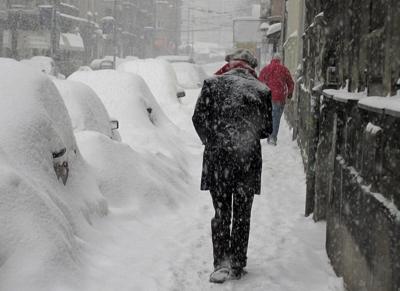Key Takeaways
Extreme temperatures cause thousands of deaths each year
Two-thirds are cold-related, and the rest heat-related
Seniors, Black people and men were more likely to die from temperature extremes
TUESDAY, Nov. 18, 2025 (HealthDay News) — Cold snaps and heat waves have contributed to tens of thousands of deaths in the United States over the past quarter-century, a new study says.
More than 69,000 U.S. deaths occurred between 1999 and 2024 where extreme cold or heat were listed as an underlying or contributing cause, researchers reported Nov. 17 in the Annals of Internal Medicine.
That’s out of a total 69 million deaths — meaning that 1 in every 1,000 deaths were related to extreme cold or heat, researchers said.
“Our findings show that both heat and cold exposure continue to claim thousands of lives every year in the United States, deaths that are largely preventable,” senior researcher Dr. Shady Abohashem, an investigator at the Cardiovascular Imaging Research Center of Massachusetts General Hospital in Boston, said in a news release.
Of those deaths, 65% were cold-related and 35% heat-related, researchers found.
“While most temperature-related deaths are still driven by cold exposure, heat-related deaths are expected to rise as climate change accelerates,” Abohashem said.
Seniors 65 and older were four times more likely to die due to extreme temperatures than younter adults, researchers found.
Results also showed that Black people were twice as likely to die from extreme heat as white people, and were also more likely to die from extreme cold.
Men were 2.6 times more likely than women to die from extreme temperatures.
“Climate change increases risks of severe weather events, and our findings underscore the need for targeted adaptation strategies, like improving housing quality, access to cooling and heating, and early-warning systems, to protect vulnerable groups as climate extremes intensify,” Abohashem said.
“The results help us understand which populations may be disproportionately affected so public health strategies can shift accordingly,” Abohashem added.
More information
The U.S. Centers for Disease Control and Prevention has more on temperature extremes.
SOURCES: Mass General Brigham, news release, Nov. 17, 2025; Annals of Internal Medicine, Nov. 17, 2025
What This Means For You
Seniors, Black people and men should be aware that they have a higher risk of dying during an Arctic blast or heat wave.





















(0) comments
Welcome to the discussion.
Log In
Keep it Clean. Please avoid obscene, vulgar, lewd, racist or sexually-oriented language.
PLEASE TURN OFF YOUR CAPS LOCK.
Don't Threaten. Threats of harming another person will not be tolerated.
Be Truthful. Don't knowingly lie about anyone or anything.
Be Nice. No racism, sexism or any sort of -ism that is degrading to another person.
Be Proactive. Use the 'Report' link on each comment to let us know of abusive posts.
Share with Us. We'd love to hear eyewitness accounts, the history behind an article.